Does The Journeyman Project deserve its cult status?


From 2010 to 2014 Richard Cobbett wrote Crapshoot, a column about rolling the dice to bring random games back into the light. This week, they say the next big thing is here, that the revolution's near, but to me it seems quite clear, that's it's all just a little bit of histo—(is deleted by temporal wave)
There's something endearing about the way The Journeyman Project managed to both hang on as both a cult classic and an adventure. Its re-release as Pegasus Prime doesn't hurt.
What's Pegasus Prime? Well, there's a tale. The original game, The Journeyman Project, was a time-travel CD-based adventure for the Mac from back in 1993; one of many to figure out that these new-fangled CD things could hold lots of pictures, high quality audio and all that other good stuff. It also ran like crap, so was re-released not that long afterwards in 1994 as The Journeyman Project Turbo. Then came a sequel, Buried In Time, as you'd expect... before once again the idea came along, "Hey. We resold this once before. Maybe we can do it again!"
And so came Pegasus Prime, a remake of the first game that came out on Mac in 1997, before the final chapter, Legacy of Time, hit in 1999. And then after all that, it was back once again—a 2014 re-release of a 1997 re-release of a 1994 re-release of a 1993 game. Even before the story begins, you need a time machine to pick this series apart. But what is it about it that's kept The Journeyman Project alive in fans' hearts all these years? Let's find out. It's about time.
The Journeyman Project (at least in the Pegasus Prime remake, once the sequel had established a few details), is the story of Gage Blackwood, hero of space and time who managed to save the world an impressive number of times over the years without his name even remotely making it into gaming consciousness.
That's what you get when you're the star of a) a first-person adventure rather than one of those fancy third-person ones, and b) have all the personality of a particularly boring eggplant. He works for the Temporal Security Agency, and since the odds that any government would set up a police unit specifically to keep tabs on fried seafood are fairly small, you can probably guess what his beat is. He's a time cop, one of a few, ahem, elite agents to have that honour, using his two main weapons: a time travel suit, and the biggest hands in the goddamn universe.
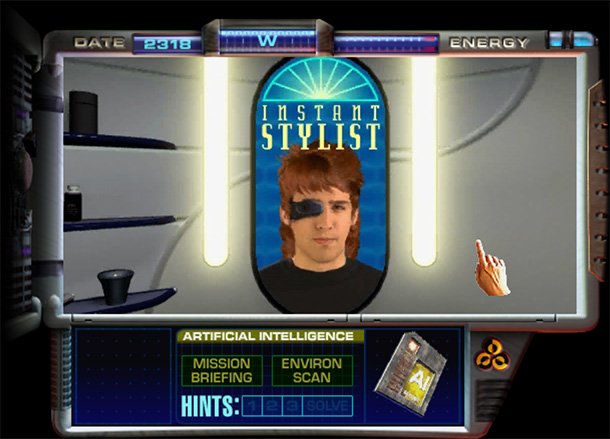
The whole series revolves around Earth's relationship with a galactic empire called the Symbiotry of Peaceful Beings, which is the kind of name that absolutely screams 'evil conquerors', but which actually turns out to be on the level. All they want to do is welcome Earth into a bold new future, for real. Unfortunately they're not the only aliens kicking around, and Earth still has its share of problems.
Wars are history. Famine, dealt with. Douchebags though, still rocking around the clock, and looking to prevent that alliance before it has a chance to begin. Before you can do anything about that, you have to get to work. More specifically, get to work without hatching plans to go back and kill a few annoyances in the crib.
The Journeyman Project's world isn't desperately exciting, but the Pegasus Prime version at least (I have played Turbo, but my memory of what was in it is a bit hazy) makes a good start of things with the kind of passive-aggressive future normally reserved for GLaDOS's favourite bits of The Hitch-Hiker's Guide.
Your alarm clock is an electric shock. The AI that guides your life is prone to delivering advice like this: "You are in your apartment, 4C, of the Caldoria Heights Complex. You, much like your rent, will be late", while your mirror demands you stop ordering so much Chinese take-out.
You work for an organisation so inept that it sees no problem with leaving one guy in charge of the entire time space continuum while everyone else goes to watch the aliens, but is so obsessed with detail that there is precisely one approved haircut. And it's really crap. On the plus side, you do have Google Glass.
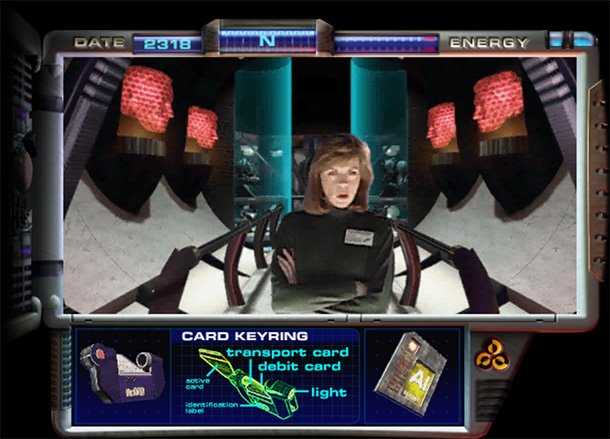
Also, you're apparently so sleepy and/or overworked that you can't think straight, which is why any time you move in the direction of a wall Gage actually smashes his head into it hard enough to shake the entire screen. This is the man who, I repeat, is given the task of monitoring the whole of space and time to prevent armageddon.
And those really are the stakes. Gage Blackwood being late for work dooms the entire planet, because everybody else who works for the TSA (the Temporal Security Agency, not the Customs Nazis) apparently decides "Oh, whatever," and just leaves the janitor in charge.
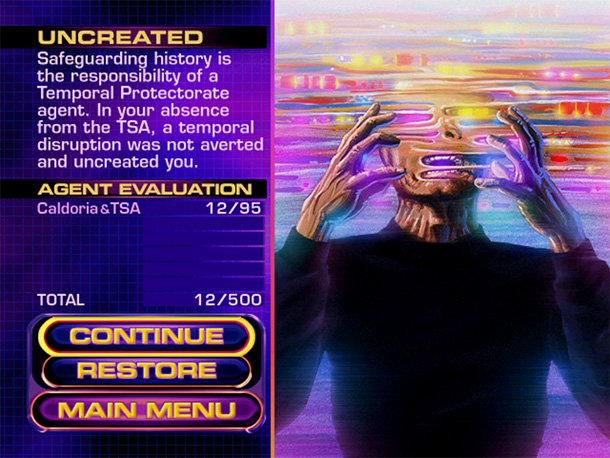
You know, it's hard to think of a less competent organisation than the TSA, and it only gets worse with the reveal of the first big plan. A temporal rip is carving its way through history, rewriting everything. That raises an important question—how do you know what's meant to be versus what's different? Maybe in the real universe, Adolf Hitler's paintings brought peace to the world. Perhaps dubstep is actually music. Well, that's OK, the TSA has the solution—a historical log to compare things with. Smart! And of course, they keep it close to hand, on the grounds that it's something they might need in a real hurry? Ha! No, they keep it two billion years in the past. You might think that this makes pretty good sense. If temporal rips work as stated, that's going to take a while to get to. And, y'know, yes. It's not a bad idea in theory.
Except for the part about putting it in a lethal jungle full of carnivorous predators.
Also, to use it you have to go back to the future, which might not even exist any more. Or worse, as Gage finds when he returns to the present to find that the boss of the TSA—living in a world where the aliens arrived and were told to piss off instead of being welcomed with open arms—realises that history has changed, and that changing it back will erase his entire life. So, instead of giving Gage his full support to repair the damage, he sends murder robots. Who the hell screens these people? Its core staff now officially consists entirely of a coward, a Google glasshole, a guy who can't even get even get up in the morning, and his fellow agent, Michelle Visard, as played by Data's girlfriend from that one episode of Star Trek: TNG.
I'm calling it. The TSA is officially the most incompetent government agency in all of fiction.
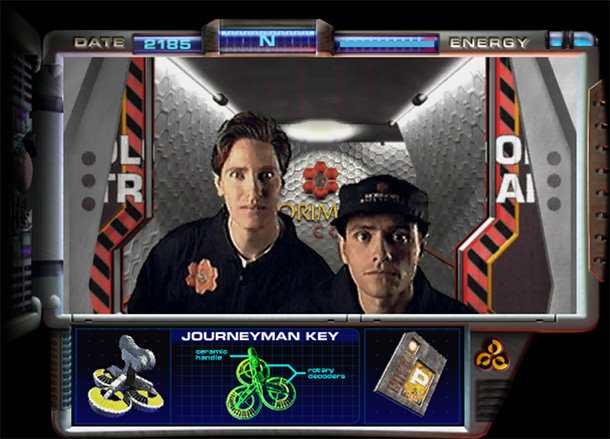
From that point, The Journeyman Project becomes a fairly standard Myst-style adventure, with a lot of ways to die horribly and a surprisingly strong sci-fi element. It's probably most notable for the fact that, despite being about time travel, you spend the whole game in various slices of the future, which is pretty unusual. Each setting has been attacked by a robot that has sabotaged humanity's entry into the Symbiotry of No Seriously, We're the Nice Kind of Aliens, We Even Brought Cake, and it's Gage's job to sort them all out and then head back to the future to confront the saboteur.
It's not the most thrilling of games by modern standards, but it does some interesting things. As a time-traveller, you're not allowed to be caught or make any waves, allowing for a good explanation of why there's no conversation and not much character interaction while still allowing for just enough to make it clear that you're not simply walking around deserted locations—a thermal scan of two guards for instance. Each part of the game also keeps track of points individually so that you can see how well you're doing, with a separate score called—no kidding—Gandhi Points for finding non-violent solutions and sleeping with naked virgins as a demonstration of chastity. Well, one of the two. You can probably guess which.
By modern standards, it's unsurprisingly slow as heck, though instant retries after death is an exceptionally generous touch that some games now still don't offer. Each world has a fair amount of impressive detail, like the Japanese colony with welcomes in different languages, and it all looks pleasant enough, aside from a few technical limitations like having to pause to do environmental animations. That's Pegasus Prime of course. The original Journeyman Project looked nowhere near as nice, didn't have anything like as much FMV, and was a much flatter experience. Pegasus Prime's job was largely to make it the game people remembered it being rather than the game it was, as well as tie the characters from the sequels back into it and give it the level of acting polish that only mid-90s FMV games could aspire to.
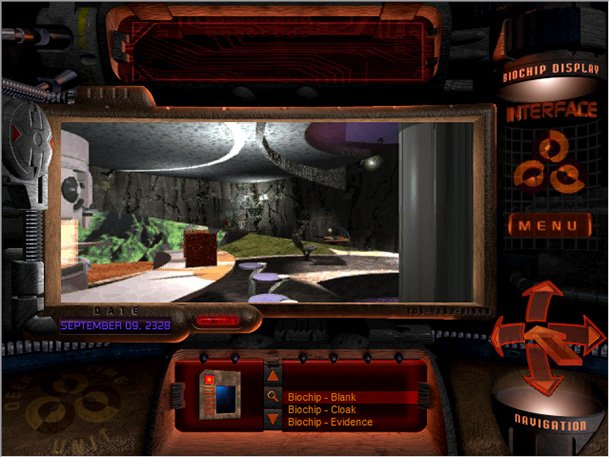
The first of those sequels was Buried In Time, which saw a major leap forwards in graphics, at least hypothetically—thanks to a game engine that prioritised interface crap over being able to actually see anything through the little slit of vision where the prettiness was meant to be.
This was where Gage Blackwood fully blossomed into the dullard we know him as, with Earth now a member of the Symbiotry of Still Not Evil, We're Cool, We're Cool. Data's girlfriend frames him for messing with time, and in the kind of confusing weirdness that only time travel really allows, he's told this by himself ("Quick, there's not much time to explain. Yes, I am you!") before more time travel agents appear to stop you meddling with time by meddling with time and yanking future you out of the present while present you goes into the future to figure out what happened in the past to prevent future you being jailed forever. Got that?
The basic game is much the same, only with more of a historical focus—locations this time including Leonardo da Vinci's workshop, where he made assassin stuff for Ezio, Chichen Itza, and a space lab. The main addition was an AI called Arthur, installed into Gage's suit early on, who sits on your virtual shoulder and makes constant wise-cracks.
Much like in Zork: Grand Inquisitor, this really helped cut down on the loneliness of Myst-style games, though not everyone appreciated his presence. Presto Studios itself happily admitted, "Some fans think he's the best thing since sliced processed cheese, while others ... well, let's just say we're lucky we didn't have a 'throw tomato' feature." Those fans were probably happy when he died at the end of the game so that Gage can save the world, only for Presto to declare "Time travel, bitches!" and return in Legacy of Time for his most memorable moment —the song at the end of the credits, after the funky music and epic Parade of Characters You've Never Heard Of.
Which brings us to Legacy of Time. Now, my feelings on the Myst series are not subtle and not spoken with any degree of shyness. I would sooner inflict a virus on my PC than one of those games. Given a choice between being stabbed in the eye with a knife and watching a Myst Let's Play, I would obviously choose the Let's Play, but still spend the whole time dreaming of sweet knives. Of the games that aped it, I can barely think of a handful that I genuinely enjoyed. Just a couple of fingers, really. See if you can guess which fingers.
What are they? They're Zork: Grand Inquisitor, which did the Myst thing with a sense of wit and humour and clever lateral thinking puzzles. And on a lesser level, Legacy of Time. I liked Legacy of Time a lot.
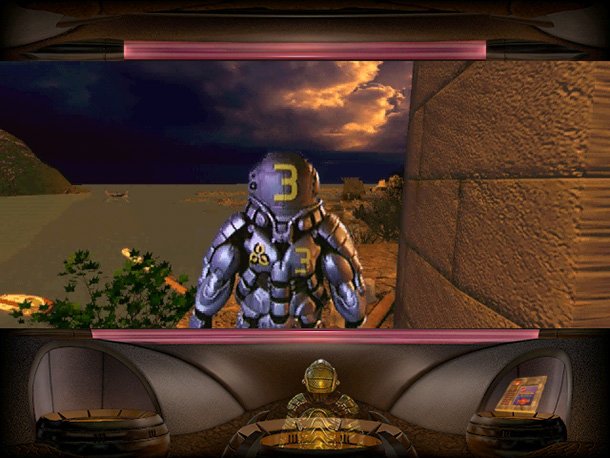
I don't necessarily think it's aged that well, and I'm certainly not saying it's one of my favourites, but it was a rare Myst-style game that landed a solid hit and I really enjoyed. A big part of this was how it took the set-up from the first two games, then switched the focus to legendary settings: Atlantis (at a time when every second game on the shelves was about bloody Atlantis, but never mind), Shangri-La and El Dorado, all visited both as crumbling ruins and then in their prime, offering a cool sense of scope that's only really possible in a story like this.
It had Arthur cracking wise and adding historical detail that was usually fun, if not strictly accurate. It also swapped the static node based system for spinny-whirly Quicktime VR environments—an old trick for faking 3D in which background images were wrapped around a sphere/cylinder so that you could look around them—and most importantly, found a work-around for the whole "don't be seen" thing. Now, Gage's time-travel suit had a chameleon circuit capable of not just passing for a local, but copying their body to interact with and annoy people. Like Ghengis Khan. It goes pretty well!
In short, it was a hell of a jump up, taking what people liked about the previous games, adding one of the most demanded features, and giving the series the technology it needed to really shine... by '90s adventure standards at least, with all the endearingly hammy FMV and goofiness that goes with it.
The plot of this one involved yet more aliens heading to Earth, with the power to blow up the Symbiotry of Peaceful But Increasingly Resentful Aliens and looking for a mysterious device called the Legacy—split, as is the way of game things, into three pieces in three cities that you get to see first destroyed and then in their prime.
It suffers from a fairly common but always hilarious face-palm bit of time-travel fiction, trying to create a race against time starring a man who wears a time travel suit, but never mind that. It rounded the series off pretty well with its detailed spinny-roundy-Quicktime-VR worlds and a plot that dived right back to the start of the series to explain precisely why the first game's villain had a problem with the peaceful aliens for the exactly one person who gave a rat's buttock, and generally ended on a high.
Or at least, that's what ultimately happened. Presto was working on a fourth Journeyman Project game, but it got canned. Instead, it ended up creating Myst 3: Killing Good Things One Game at a Time, and a truly dreadful Star Trek game called Hidden Evil that was a semi-sequel to the movie Insurrection and at least self-aware to try and keep that firmly on the down-low. Its final humiliation on PC though came in the form of one of the dumbest cash-ins anyone is ever likely to see, the horror that was Stephen King's F13. A tragic end to a company that never made it big, but at least did make a lot of friends along the way.
Oh, and you'll be pleased to know that no, the TSA never did become competent. At the start of Legacy of Time they've been shuttered due to the Symbiotry of Not the Borg Resistance is Perfectly Acceptable and Will Probably Work deciding that humanity shouldn't be dicking around with time travel, forcing Gage to take a prototype suit with him. Such is the agency's incompetence that with a temporal rip about to—once again—rewrite the entire world and potentially destroy everything humanity is or has ever been, he's actually warned that doing his job may damage his promotion prospects.
Where did the TSA get this bunch? Were there no chimps left at the zoo?
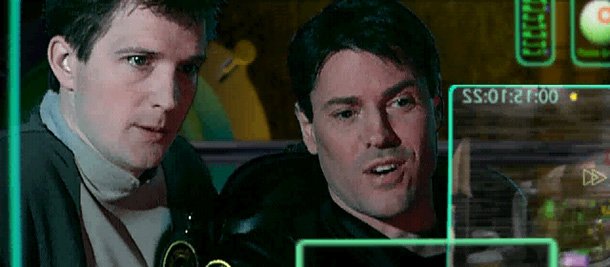
So, does the series deserve its cult following? Arguably, half of it. The original Journeyman Project and Buried in Time are largely forgettable; fine for their era, but not really doing that much to mark them as special on PC. On Mac of course, the lack of games didn't hurt anything that was vaguely playable, but we had these magic things called Standards.
The double-whammy of Pegasus Prime and Legacy of Time though are still pretty endearing. Slow as hell, not the best puzzles, and showing their age more than their historical locations, but with a definite sense of charm that still holds out. Largely that's because while Presto didn't exactly write stories for the ages, and none of the Journeyman Project games have one desperately worth remembering, they had enough self-awareness to have fun with them once they were there. They're games that generally play things straight, but aren't afraid to poke and prod and make fun just enough to keep the wheels greased and turning properly. It really helps.
They're certainly not classics that you absolutely have to check out, but yes, there are definitely good reasons why people remember them fondly. Whether or not they include Arthur... that's the question. But at least if you do hate him, you can gag him.